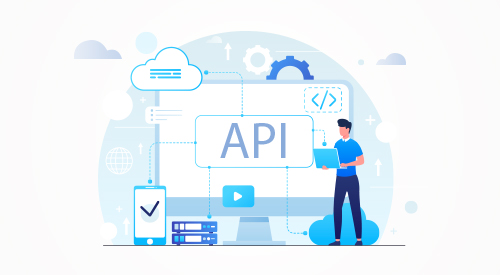

Digital transformation has become a priority for businesses across various industries as they seek to stay competitive in the modern digital economy. One essential component of digital transformation is the use of Application Programming Interfaces (APIs). APIs allow companies to create digital value chains that streamline business operations, enhance customer experience, and drive innovation. An API management platform is a critical tool for businesses looking to build digital value chains using APIs. This allows companies to create, manage, and monitor their APIs effectively. Here we will explore how companies can build digital value chains using API management platforms.
Streamline Operations & Improve Customer Experiences with Apigee
Digital value chains refer to the interconnected processes that create and deliver digital products or services. These value chains encompass a range of activities, such as data collection, analysis, processing, and distribution. By creating digital value chains, businesses can streamline their operations, improve their customer experience, and drive innovation. APIs play a crucial role in building digital value chains, as they enable businesses to integrate and automate various processes across the value chain. With APIs, businesses can connect different systems, data sources, and applications to create seamless digital experiences for their customers and employees. By leveraging APIs and API management platforms, businesses can build robust digital value chains that enhance their competitiveness in the digital economy.
Building a digital value chain
- Define your digital value chain
The first step in building a digital value chain is to define the business processes that you want to automate using APIs. A digital value chain comprises various activities such as data collection, analysis, processing, and distribution. By defining your digital value chain, you can identify the APIs needed to support each activity and determine the API management platform that can best support your business.
- Select the right API management platform
Choosing the right API management platform is crucial to building a successful digital value chain. An API management platform should provide the necessary tools to create, manage, and secure APIs effectively. It should also provide the necessary analytics and monitoring capabilities to track API usage and performance.
Some of the critical features to look for in an API management platform include:
- API design and development tools
- API lifecycle management
- API security and access control
- API analytics and monitoring
- Developer portal and documentation
- Design and develop your APIs
Once you have selected an API management platform, the next step is to design and develop your APIs. Your APIs should be designed to meet the specific needs of your digital value chain. API design should consider the data formats, protocols, and standards that will be used in the digital value chain.
API development should follow best practices and adhere to the principles of RESTful API design. This includes designing APIs that are resource-based, stateless, and cacheable. API development should also follow security best practices to ensure that APIs are secure and can be accessed only by authorized users.
- Implement and test your APIs
After designing and developing your APIs, the next step is to implement and test them. API implementation should follow industry standards and adhere to the protocols and data formats specified in the API design phase. API testing should cover functional testing, load testing, and security testing.
API testing should also cover performance testing to ensure that APIs can handle the expected load and can respond to requests within the desired timeframe. The API management platform should provide the necessary tools to implement and test APIs effectively.
- Monitor and optimize your APIs
Once your APIs are live, it’s essential to monitor their usage and performance to ensure that they are meeting your business objectives. API monitoring should cover key performance indicators such as response time, throughput, and error rates.
API optimization should focus on improving API performance and reducing response times. This can be achieved through techniques such as caching, load balancing, and horizontal scaling. The API management platform should provide the necessary tools to monitor and optimize APIs effectively.
Apigee – The complete API management platform
Apigee is a leading API management platform that offers a comprehensive set of tools for building and managing digital value chains. Apigee provides an API platform that enables companies to create, manage, and secure APIs, as well as gain insights into API usage and performance.
Apigee services includes a policy engine that allows businesses to implement custom policies to enforce API security, rate limiting, and caching. Apigee’s analytics dashboard provides real-time visibility into API performance, usage, and errors. The platform also includes a developer portal that allows developers to discover, learn, and test APIs.
Apigee’s platform also integrates with other enterprise systems, such as customer relationship management (CRM) and enterprise resource planning (ERP) systems, to enable seamless data exchange across the organization. The platform supports a wide range of API protocols, including REST, SOAP, and GraphQL, and provides tools for API versioning and lifecycle management.
One of the key benefits of Apigee is that it allows businesses to monetize their APIs, which means they can charge other companies or developers for accessing their APIs for using their data.
By using Apigee, companies can create API-driven business models that enable them to offer innovative products and services to their customers. For example, a company that has an API for weather data can sell access to that data to other companies that need it for their own applications, such as travel or logistics. This creates a new revenue stream for the company and allows it to expand its offerings beyond its core business.
Apigee also provides tools for managing the entire API lifecycle, making it easier for companies to ensure that their APIs are performing as expected and that they are protected from security threats.
Overall, Apigee is a powerful platform that allows businesses to leverage their APIs to create new revenue streams and innovative business models. With its comprehensive set of tools and services, Apigee is a valuable asset for any company that wants to take advantage of the benefits of APIs.
Here are some of the benefits of using Apigee:
- Comprehensive API management tools for creating, managing, and securing APIs
- Developer portal for easy API discovery and testing
- Customizable policy engine for implementing security, rate limiting, and caching policies
- Real-time analytics dashboard for monitoring API performance and usage
- Integration capabilities with other enterprise systems for seamless data exchange
- Support for a wide range of API protocols, including REST, SOAP, and GraphQL
- Tools for API versioning and lifecycle management.
Overall, Apigee provides businesses with the necessary tools to build and manage robust digital value chains that enhance their competitiveness in the digital economy.
Apigee case studies with Niveus
- India’s leading NBFC company required a scalable solution to manage their .NET APIs and ensure secure partner onboarding. We helped to build a vast partner ecosystem, and enabled seamless API exposure to internal and partner user groups, while gaining improved security and scaling
- India’s leading players in chemical manufacturing had no APM tool to automate the monitoring of API consumption and performance in their current dealer portal and Autoplant environment. We leveraged Apigee to unify management of all their APIs on a single window, including API governance, API latency tracking, analytics, performance, etc
- A global automotive manufacturer was looking to strengthen their connected car ecosystem – from manufacturers to dealers, improve post-purchase consumer experience, and build long-term consumer loyalty. We helped them build an API-driven, API-first platform on GCP with integration at its heart to connect developers and industry partners, and bring together revolutionary services and products for end consumers, while gaining a better security posture
- A multinational technology company wished to speed up their release cycles and improve client acquisition to create and manage a superior B2B customer experience in a continually disruptive market. We reduced partner onboarding time from 6 weeks to 2 days, with effortless access to API production, and streamlined operational efforts
In conclusion, building digital value chains using API management platforms is a critical component of digital transformation. By following the steps outlined in this blog, businesses can create digital value chains that streamline operations, enhance customer experience, and drive innovation. The key is to select the right API management platform and follow best practices in API design, development, implementation, testing, monitoring, and optimization.











